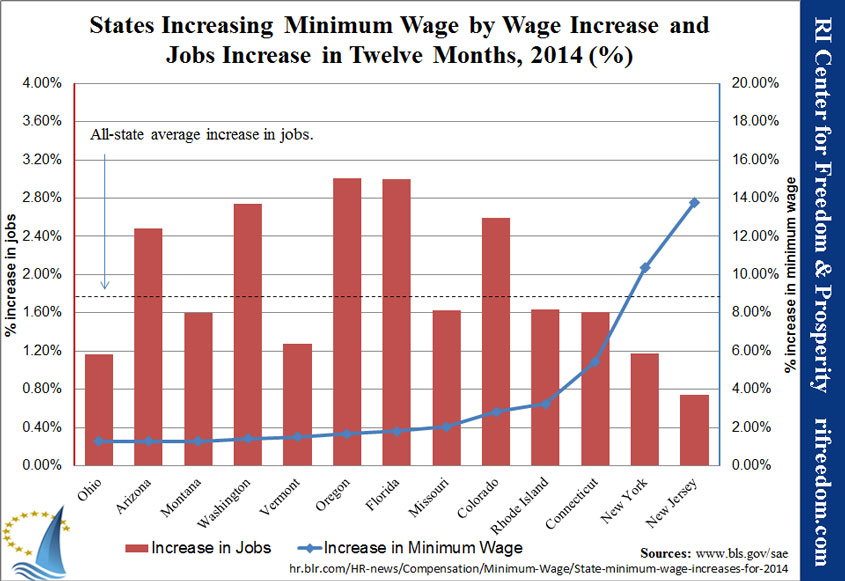Minimum Wage and Raimondo’s Plan to Risk Jobs for Politics
One may not realize it, reading an article in Saturday’s Providence Journal, but there are people who hear that Rhode Island Governor Gina Raimondo wants “an increase in the state’s minimum wage to $10.10 an hour,” from its current $9.00, and wonder: Why does the governor want to destroy jobs?
So obvious is it — to people with a certain understanding of economics — that raising the minimum wage hurts workers that it’s difficult for us not to conclude that the move is pure politics, with a complete disregard for the effects that the policy might have on the state’s most vulnerable workers. And so, I tweeted such thoughts after reading the article, and upon request, I provided a 2013 study by the RI Center for Freedom & Prosperity, which found that increasing the minimum wage from a $7.40 rate at that time to $10.10 would cost Rhode Island 3,466 jobs. To that, Rhode Island resident Jenny Norris directed my attention to “a more reliable source.”
The link on Ms. Norris’s tweet was to an NPR article, which summarized an AP article from last July, when progressive activists were citing jobs data purporting to show that “the 13 U.S. states that raised their minimum wages at the beginning of this year are adding jobs at a faster pace than those that did not.” Whether NPR, the AP, a progressive activist, or even the Bureau of Labor Statistics (BLS) is “a more reliable source” than the Center is a matter of opinion. However, it’s closer to a fact to say that the progressives’ finding was about as meaningless as it’s possible to get and still be writing coherent sentences.
The following chart shows the 13 states’ percentage increases in the minimum wage (blue line) and percentage increases in jobs (red columns), as compared with the average state’s increase in jobs whether or not it increased its minimum wage (dashed black line). As you can see, there’s not much of a trend, but if there is one, it’s that big minimum wage increases suppress jobs. Of the 13 states that increased their minimum wages, only six (fewer than half) outperformed the national average. Of the six that increased their minimum wages by more than 2%, only two (one-third) did better than average. And of the three that increased their minimum wages by more than 4% (by $0.45, $0.75, and $1.00), none outperformed the national average.
That’s not a very encouraging result for activists seeking to increase the minimum wage, and it gets worse if we look at the whole year.
After twelve months, only five of the 13 states exceeded the national average job increase, and those below it tended to miss the mark by a wider margin than at six months. Moreover, although there doesn’t seem to be a pattern for those that raised their minimum wages just a little, among those that increased it above 2%, there does appear to be some correlation… but with slower job increases correlating with larger increases in the minimum wage.
Of course, this is all correlation, not causation, but to modify a quotation from John Schmitt, the economist from the progressive Center for Economic and Policy Research whom the AP cited in July, “It raises serious questions about the claims that a raise in the minimum wage is not a jobs disaster.” If Governor Raimondo pushes for a $10.10 minimum wage, that would be a 12.2% increase, putting Rhode Island even farther to the right on the chart.
Hopefully, as Raimondo releases more details about her budget and economic plan, Rhode Island voters and journalists will ask her whether she’s taking a knowing risk with people’s job prospects in order to achieve a political talking point.




